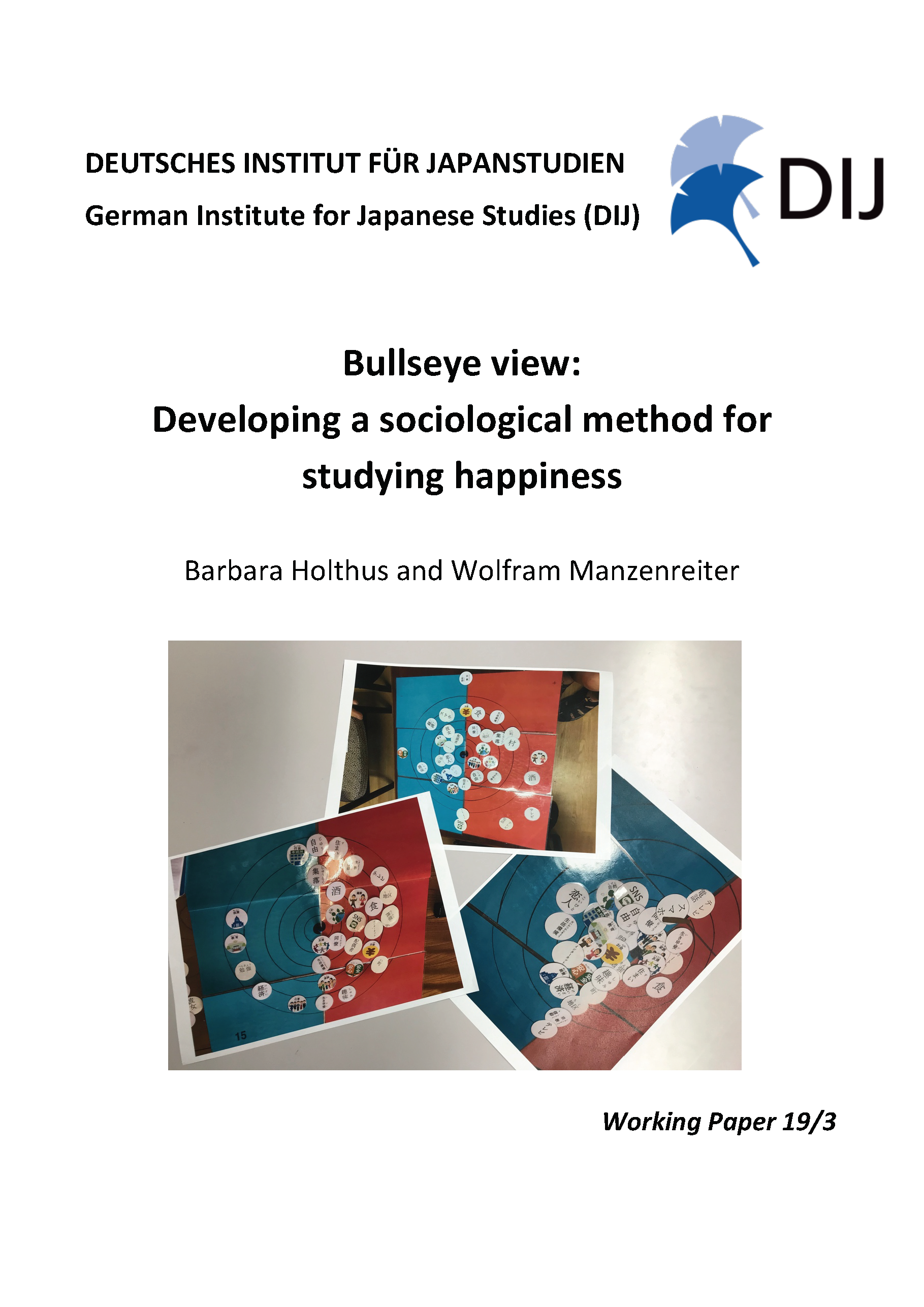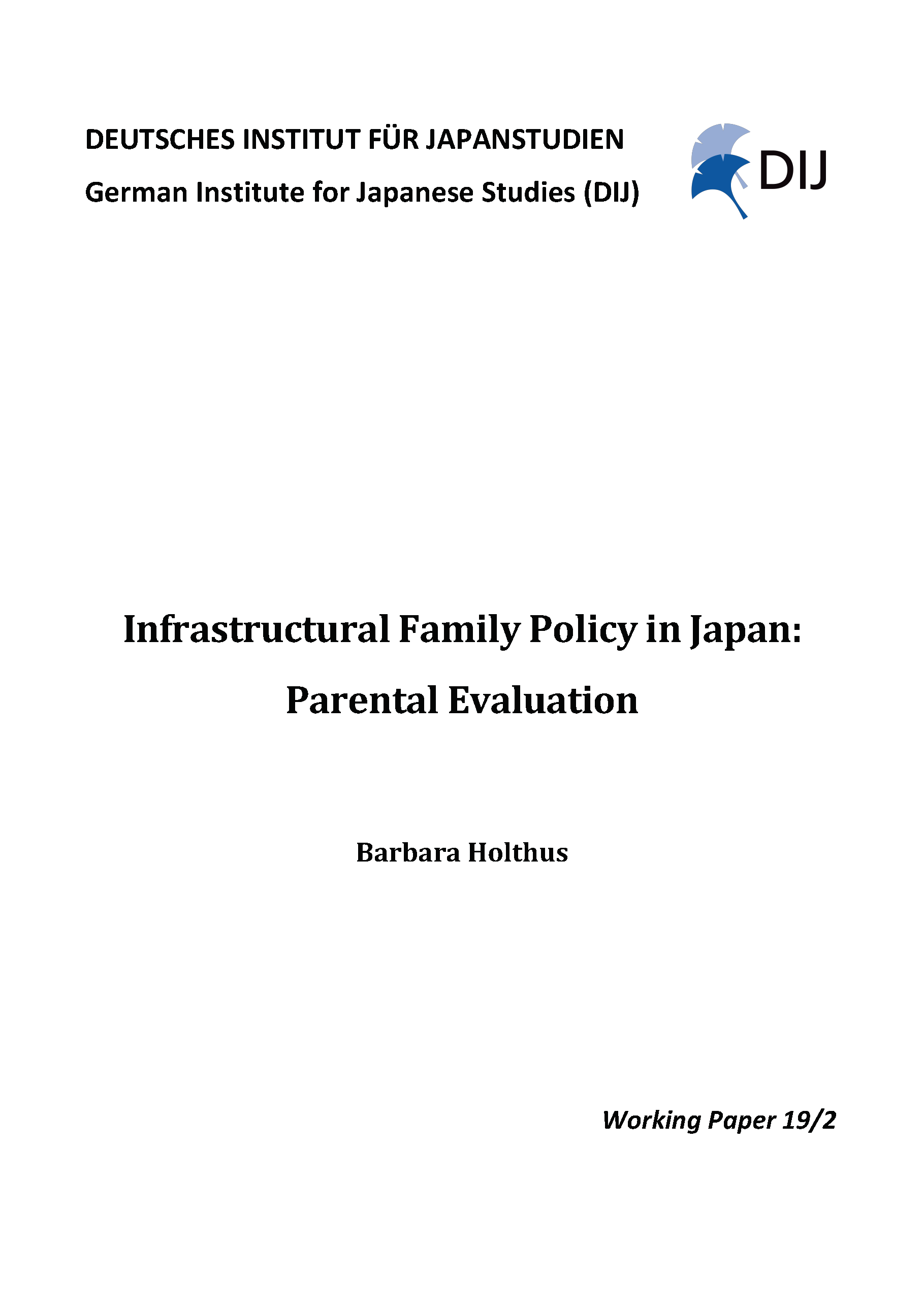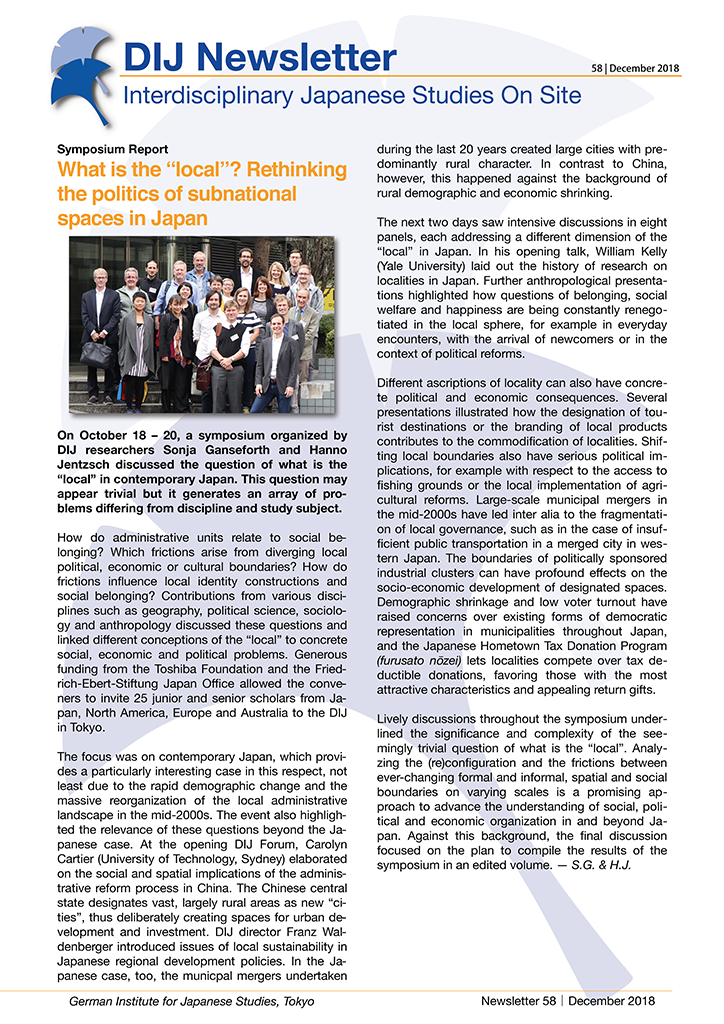Veranstaltungen und Aktivitäten
Bullseye view: Developing a sociological method for studying happiness
 Happiness research has gained tremendous popularity, yet research by anthropologists and sociologists trails behind in comparison to economists and psychologists. A sociological study that aims to understand the multidimensionality of happiness in Japan by focusing on a culture-sensitive understanding of happiness remains a desideratum. Therefore we developed a three-partite approach to studying happiness and life satisfaction: (1) word association, (2) in-depth conversation on happiness and life satisfaction issues using a bullseye-structured chart, which we refer to as “board game”, with tokens for visualization of dimensions’ overall importance, and satisfaction and dissatisfaction with them, (3) three quantitative questions on happiness, followed by in-depth discussion to tie to the multitude of existing quantitative studies. To test the methodology, we conducted 23 semi-structured interviews with Japanese men and women in rural Japan. We find that happiness is multidimensional, is an interpretative process, varies over the life course, and that the desire to maximize happiness is not universal. We argue to have created a methodology which we believe can be modified to be used in any country and with diverse population groups, while remaining culture-sensitive throughout.
Happiness research has gained tremendous popularity, yet research by anthropologists and sociologists trails behind in comparison to economists and psychologists. A sociological study that aims to understand the multidimensionality of happiness in Japan by focusing on a culture-sensitive understanding of happiness remains a desideratum. Therefore we developed a three-partite approach to studying happiness and life satisfaction: (1) word association, (2) in-depth conversation on happiness and life satisfaction issues using a bullseye-structured chart, which we refer to as “board game”, with tokens for visualization of dimensions’ overall importance, and satisfaction and dissatisfaction with them, (3) three quantitative questions on happiness, followed by in-depth discussion to tie to the multitude of existing quantitative studies. To test the methodology, we conducted 23 semi-structured interviews with Japanese men and women in rural Japan. We find that happiness is multidimensional, is an interpretative process, varies over the life course, and that the desire to maximize happiness is not universal. We argue to have created a methodology which we believe can be modified to be used in any country and with diverse population groups, while remaining culture-sensitive throughout.
NIRA オピニオンペーパー no.43 /2019 .Feb
21世紀の「資源」: ビッグデータ
―技術、ビジネス、法の観点から考える―
NIRA 総研はドイツ日本研究所との共催で、2018年11月1日に「ビッグデータ」ワークショップを開催。実務家や研究者、政府関係者など、多彩なポジションのスピーカーが、ビッグデータの特徴や問題点を語った。
✓ ビッグデータは21世紀の「資源」といわれ、20世紀に成長をけん引した石油にも比される。ビッグデータが「資源」となるために必要なものは何か。
✓ IoT モジュールなど最新の技術開発が先進的なサービスを可能にする一方、AI がもたらすバイアスなどの負の影響をどう考えるべきか。
✓ ビッグデータを活用したビジネスを開花させるために、企業や個人が安心してデータを共有、取引する仕組みは何か。企業や政府は、この課題にどう取り組んでいるのか。
✓ データの特性を踏まえた制度の構築、すなわち、巨大プラットフォーマーによるデータ市場の独占や、個人のプライバシー保護についての規制や制度はいかにあるべきか。
今回の議論から、新しい価値を生むための技術の構築、ビジネスを活発化させるためのデータ取引や集約の仕組みづくり、そして石油にはないデータの特性を踏まえた制度の整備に早急に取り組む必要があることが浮き彫りとなった。
ワークショップ: Big Data – the new competitive paradigm. How well is Japan prepared?
Infrastructural Family Policy in Japan: Parental Evaluation
 The continuing low fertility rate in Japan, coupled with high ageing is a severe problem for Japan’s social welfare system and its economy. One important element of family policies is to provide affordable and good quality childcare institutions. In international scholarship on the evaluation of family policies, surveying parents specifically in regard to their satisfaction with family policies is rare. For the case of Germany, studies find daycare expansion positively associated particularly with maternal subjective well-being, with some differences between parents in West and East Germany, as well as that parents’ education, their income, and the age of the child all impact their levels of satisfaction with family policies. Mirroring the study by Camehl et al. (2015) and applying this to the case of Japan, I conducted a quantitative analysis of the JPWS 2012 (Japan Parental Well-Being Survey) data. Findings are that Japanese mothers’ and fathers’ own experiences are an important indicator for their satisfaction with family policies. If they managed to secure a childcare space, in particular in a public daycare center, they are more likely to be satisfied with family policies. A place in a public daycare center in contrast to any other childcare institution contributes most significantly to the parents’ satisfaction with family policies.
The continuing low fertility rate in Japan, coupled with high ageing is a severe problem for Japan’s social welfare system and its economy. One important element of family policies is to provide affordable and good quality childcare institutions. In international scholarship on the evaluation of family policies, surveying parents specifically in regard to their satisfaction with family policies is rare. For the case of Germany, studies find daycare expansion positively associated particularly with maternal subjective well-being, with some differences between parents in West and East Germany, as well as that parents’ education, their income, and the age of the child all impact their levels of satisfaction with family policies. Mirroring the study by Camehl et al. (2015) and applying this to the case of Japan, I conducted a quantitative analysis of the JPWS 2012 (Japan Parental Well-Being Survey) data. Findings are that Japanese mothers’ and fathers’ own experiences are an important indicator for their satisfaction with family policies. If they managed to secure a childcare space, in particular in a public daycare center, they are more likely to be satisfied with family policies. A place in a public daycare center in contrast to any other childcare institution contributes most significantly to the parents’ satisfaction with family policies.
Furthermore, the region of living is a highly significant factor. Parents in the urban metropolitan areas of Kanto and Kinki are significantly less satisfied—due in part to the fact that in these urban areas daycare spaces are more difficult to get than in anywhere else. In regards to infrastructural family policy satisfaction, gender differences in satisfaction pale in comparison to regional differences. it is hoped that policy makers will acknowledge the importance of evaluating the “success” of family policies by the level of satisfaction of parents with family policies, and that the diverse conditions and needs of families in different regions be adequately addressed.
Dreaming of Being a Chef? The Overseas Mobility of Young Japanese Women and Their Employment in Düsseldorf’s Japanese Foodscapes
 The temporary and permanent presence of numerous Japanese citizens in Dusseldorf is certainly one of the reasons why the offerings of Dusseldorf’s ‘Japanese’ food sector are particularly extensive and diverse in comparison to other German cities. In spite of increasing academic interest in the growing Japanese foodscapes, in Japanese communities abroad, and in the overseas mobility of Japanese women, so far there is almost no research on the relationship among these topics.
The temporary and permanent presence of numerous Japanese citizens in Dusseldorf is certainly one of the reasons why the offerings of Dusseldorf’s ‘Japanese’ food sector are particularly extensive and diverse in comparison to other German cities. In spite of increasing academic interest in the growing Japanese foodscapes, in Japanese communities abroad, and in the overseas mobility of Japanese women, so far there is almost no research on the relationship among these topics.
Düsseldorf and the (young) women who work in gastronomy there offer an interesting case study in this context. Using qualitative data from a field study in Dusseldorf’s ‘Japanese’ foodscapes from 2016 onwards, this article focuses on young Japanese women working in this sector.
DIJ Newsletter 58 erschienen
 Symposiumsbericht: Was ist „lokal“? Neue Ansätze zur Erforschung sub-nationaler Räume in Japan
Symposiumsbericht: Was ist „lokal“? Neue Ansätze zur Erforschung sub-nationaler Räume in Japan
Vom 18. bis zum 20. Oktober diskutierte am DIJ ein internationales Symposium die Frage: Was ist das „Lokale“ im gegenwärtigen Japan? Diese Frage mag trivial klingen – tatsächlich bringt sie jedoch je nach Disziplin und Forschungsgegenstand ganz unterschiedliche Problemstellungen hervor.
DIJ’s Flagship Journal: Contemporary Japan
In Contemporary Japan, der am DIJ herausgegeben internationalen Fachzeitschrift, erscheinen in zwei jährlichen Ausgaben doppelt begutachtete originäre wissenschaftliche Aufsätze auf dem Gebiet der sozial- und geisteswissenschaftlichen Japanforschung sowie Buchbesprechungen zu Neuerscheinungen in dem Bereich.
DIJ NIRA Workshop: Big Data – Wie gut ist Japan auf die digitale Transformation vorbereitet?
Big Data ist ein Kernbestandteil der digitalen Transformation. In einer digitalisierten und vernetzten Welt fallen Daten im Überfluss an. Sich rapide entwickelnde Anwendungen ermöglichen die Verarbeitung, Integration und Analyse voluminöser multimedialer Daten auf immer schnellere und intelligentere Weise. Sie eröffnen unermessliche Potenziale für Forschung, Wirtschaft und Politik.
Festakt im Hotel New Otani: 30 Jahre DIJ
Gemeinsam mit 170 geladenen Gästen, darunter hochrangigen Vertretern aus Wissenschaft, Wirtschaft und Politik, feierte das DIJ am 31. Oktober sein dreißigjähriges Bestehen.
Aktuelle Statistik: Weniger Überstunden: Ein Erfolg von Abes „Arbeitsstilreform“?
Die Entwicklung der Überstunden reagiert traditionell stark auf die wirtschaftliche Entwicklung. Doch seit 2016 fällt die Zahl der Überstunden fast durchgehend trotz Wachstum.
DIJ monograph 62 released:
Parental well-being. Satisfaction with work, family life, and family policy in Germany and Japan
 „Pursuing happiness is not only idealistic, it is the world’s best and perhaps only hope to avoid global catastrophe“ (Global Happiness Policy Report 2018). With that, the report argues for happiness as overarching policy goal. This volume argues that parental well-being is well qualified to assume a central role for governments of industrially advanced nations that are in need of coping with the challenges of low fertility and societal aging.
„Pursuing happiness is not only idealistic, it is the world’s best and perhaps only hope to avoid global catastrophe“ (Global Happiness Policy Report 2018). With that, the report argues for happiness as overarching policy goal. This volume argues that parental well-being is well qualified to assume a central role for governments of industrially advanced nations that are in need of coping with the challenges of low fertility and societal aging.
More than 4000 mothers and fathers of young children in Germany and Japan have been surveyed in regard to their well-being and satisfaction with many aspects related to their work and family lives. The volume brings together 13 scholars to analyze this unique dataset. The chapters fall into three main parts: (1) parenting and childcare, (2) self, social relatedness, and social structures, and (3) family policy well-being. A particular focus lies on the well-being of mothers in contrast to fathers. The volume uses a multidimensional concept of parental well-being, with each chapter highlighting one dimension, ranging from health, education, employment, and family policy satisfaction to partnership, social network, and childcare satisfaction. National differences are in several aspects superseded by gender, class, and personality types.
Bouncing Back After Failure: Perceived and Actual Similarity as a Coping Resource in Multinational Work Teams
Multinational work environments challenge the coping capabilities of employees with additional culture-related stressors above and beyond those usually found at the workplace. This paper examines the differential effects of perceived team leader / member similarity, their actual national similarity, and the mutual overlap in personal values on the coping potential of team members in a multinational work team setting, with a special focus on the Japanese context. An analysis of the data provided by 365 dyads of multinational team leaders and members in mixed Japanese/non-Japanese work teams revealed that the coping abilities of team members who shared the leader’s country of origin (surface level national similarity) were not significantly higher than those of team members who came from a different country. Conversely, the actual overlap in personal values endorsed by a team’s leader and each individual team member emerged as a robust predictor for that team member’s coping potential, both directly and indirectly through generalized similarity perceptions. This highlights that in order to understand why some multinational work teams work out in the long run and others do not, an overly strong focus on surface characteristics of their composition (e.g., national or ethnic diversity) may not be an optimal approach. In many cases, the actual determinants may be the perceived and experienced match or mismatch between the deep-level psychological characteristics (e.g., shared personal values) of team members and their leaders.
The Politics of Balancing Flexibility and Equality: A Comparison of Recent Equal Pay Reforms in Germany and Japan
In Germany and Japan, like in most OECD countries, the equal pay for equal work principle and other regulations related to equal treatment have been strengthened recently through reforms. These have been justified and promoted as measures to address gender wage gaps as well as discriminatory practices regarding non-standard workers. Yet, observers remain sceptical as to whether these reforms will be effective. Previous research has argued that Germany and Japan as “socially conservative welfare states” (Gottfried and O’Reilly 2002) face particular institutional and value-related obstacles for achieving equal treatment in practice. This paper argues that, while these factors remain important, gaps between policy output and persisting inequalities are increasingly the result of a strategically motivated politics of balancing. Policymakers in both countries use existing institutions such as collective bargaining and labour-management consultations to balance conflicting policy goals, i.e. improving equal treatment and maintaining employment flexibility, which crucially relies on differentiated treatment of workers by, for example, distinguishing between standard and non-standard workers. By resorting to strategies of balancing policymakers hope to console both objectives while mitigating the political risks of controversial structural reform.











 Open Access
Open Access 
